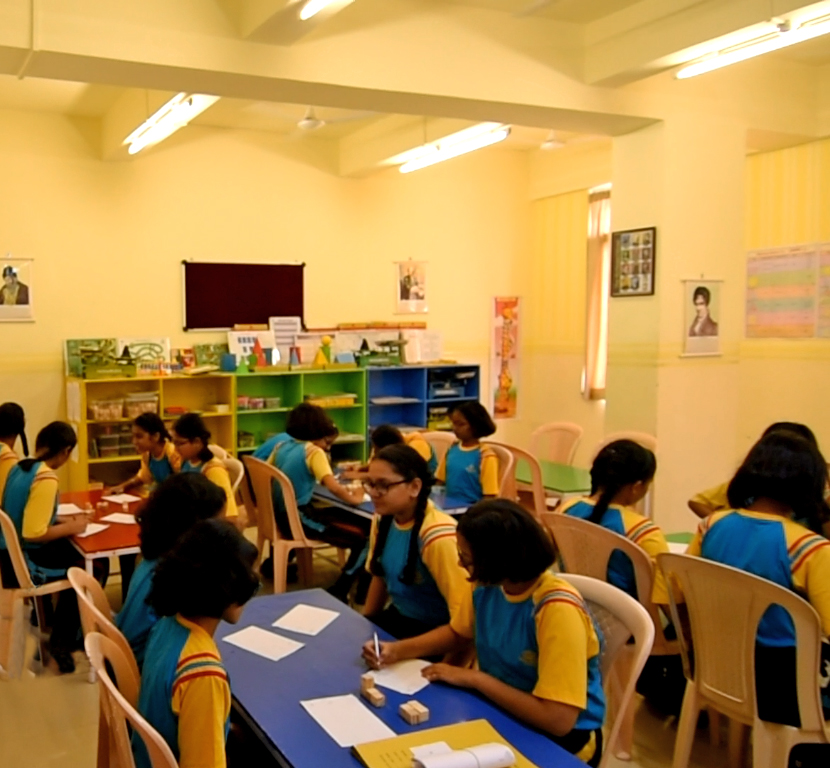Mathematics starts from kindergarten with an introduction to Numeracy and Concepts all the way up to comparisons and basic addition and subtraction by the time they finish Sr KG.
Students have a formal mathematics class everyday of the week, right from Std. 1. From Std 5 onwards, they have 7 classes a week.
We love Math, and we want our students to love it too. We do a lot to make sure we walking the talk.
The math classroom has projectors which display on big boards. The teachers interact with the students and the presentations to make sure kids “get” the concept.
We have supportive cocurriculars such as Mental Math, Mental Ability, Hands on, Strategic Thinking and Computational Thinking which work on their understanding, logic, problem solving ability and concepts – all of which play a big role in cracking the scare of Mathematics.

Here are some glimpses into the innovative teaching methods of our core Mathematics program that set Walnut apart.
Step-by-Step Learning Process:
In Math, it is important to step up the difficulty level across every exercise. Any conventional textbook has problems that are all mixed up and the kids don’t get enough practice with one technique before moving on to the next. On our worksheets we have built up the level and the techniques step by step. So even what they practice later at home reinforces the skills they have learnt that day to make that foundation strong.
Take a look at our Mathematics material from Std. 5 onwards. You will see that the questions are also additionally segregated as Easy, Medium, Hard and HOTS. So, even within a concept our students move incrementally ahead. That makes it a sure and steady path ahead.
At Walnut, every math class is structured to help students gradually build on their knowledge. We break down each lesson into bite-sized concepts, so students never feel overwhelmed. Then we have a flow that ensures a logical completion of each chapter with understanding, studying and testing before we move on to the next one.

Here is how it works:
- Teaching the Concept: The teacher first introduces the concept with interactive explanations and solved examples.
- Practice Problems: Next, students solve related problems from the textbook in class, where the teacher can guide them if they get stuck.
- Exemplar Questions & Revision: Each chapter ends with exemplar questions that push students to apply what they’ve learned, followed by revision sessions to reinforce the material.
- Try-a-Test: Once the chapter is complete, students participate in a low-pressure, high-frequency test. These tests make exams feel familiar and approachable—helping students succeed, without fear.
Why It Matters: The repetition of core ideas combined with regular testing ensures that students are ready for more complex topics as they progress through the program.
Pre Exposure through Mental Math :
Our Mental Math classes, held twice a week, are designed to strengthen students’ abilities to process problems quickly and logically plan solutions. Unlike typical math programs that focus on calculation speed, Walnut’s Mental Math teaches conceptual understanding.
Here’s how it works:
- Pre-Exposure: Mental Math prepares students for the topics they will encounter in their Core Math classes. By understanding the logical steps behind a problem, students are mentally prepared before tackling it in-depth.
- Fast-Paced Learning: These classes are designed to keep students engaged and on their toes. Students solve problems quickly, training their brains to think efficiently.
- Full Participation : The format of the class is such that all students can participate in answering all the questions. There are several of each level with all required information presented. So even if a student can get the first few, they definitely catch on and are able to answer the later ones. So their brains are constructively and positively engaged in the concepts being discussed.
- No Calculations: The focus is on the thought process. Students aren’t asked to compute, but rather to understand how to break down complex problems into manageable steps.
Why It Matters: This approach builds logical reasoning skills that students can apply across all subjects—not just math.

Nursery, Jr KG, Sr KG
The students have one class each of LEARN and WRITE on a daily basis. They start with an introduction to numbers followed by understanding what they mean and different concepts in numeracy. By the end of Sr. KG students are able to handle basic problems mentally and even process word problems! All because of our advanced academics.
In addition to the everyday classes, these activities support the subject too.
MENTAL MATH : 2 or 3 classes a week. Students look at a problem, and strategize on how to solve it step by step. Makes a world of a difference!
STRATEGIC THINKING : Once a week. Students get to work on dynamic challenges and quick thinking.
In addition to the everyday classes, these activities support the subject too.
MENTAL MATH : 1 class a week. Students look at a problem, and strategize on how to solve it step by step. Makes a world of a difference!
STRATEGIC THINKING : Once a week. Students get to work on dynamic challenges and quick thinking.
In addition to the everyday classes, these activities support the subject too.
MENTAL MATH: 1 class a week. Students look at a problem, and strategize on how to solve it step by step. Makes a world of a difference!
STRATEGIC THINKING: Once a week. Students get to work on dynamic challenges and quick thinking.
Regular Math Classes : 7 times / week